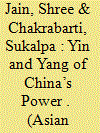|
|
|
Sort Order |
|
|
|
Items / Page
|
|
|
|
|
|
|
| Srl | Item |
| 1 |
ID:
108079


|
|
|
|
|
| Publication |
2011.
|
| Summary/Abstract |
The People's Republic of China asserts that it is a responsible power in international affairs, emphasizing its participation in UN peacekeeping as evidence of its exemplary behaviour. In order to uncover what 'responsible power' means in the context of Chinese participation in peacekeeping, this article analyses the motivations and barriers that shape China's peacekeeping deployments. The term 'responsible power' has value not only because it is flexible, capturing China's ambivalence regarding peacekeeping, but also because 'responsible power' enables China to frame the discourse regarding its foreign and security policy. It appears that for the near future, China remains committed to modest engagement in peacekeeping. The article concludes that China has the potential to foster an ever more constructive role in the UN peacekeeping regime. However, in order to effectively engage China, a deeper understanding of the policy priorities of Chinese foreign policy actors is needed.
|
|
|
|
|
|
|
|
|
|
|
|
|
|
|
|
| 2 |
ID:
167750


|
|
|
|
|
| Summary/Abstract |
A COUNTRY'S IMAGE in the minds of those who live inside and outside it depends on the logic and goals of its development. In the process of construction, its elements might differ by time and resources needed to create and consolidate them. The result, likewise, may be different where the length of time needed to produce the desired effect and the effect itself are concerned. An image of a country responsible for the development of mankind and its security is time- and resource-consuming to the greatest extent while inevitable contradictions between global responsibility and national interests make it idealistic and unachievable. Many countries, however, claim the status of responsible - either regional or global - powers depending on their scope and development goals.
|
|
|
|
|
|
|
|
|
|
|
|
|
|
|
|
| 3 |
ID:
190077


|
|
|
|
|
| Summary/Abstract |
The Pew Research Center survey reports an increasing unfavorable view of China worldwide. In the Soft Power 30 index, China fares at a rank of 27th, far behind its aim of global leadership. The world’s leading economic power (in terms of purchasing power parity), a military power second only to the United States, a nation with a formidable global presence, a robust civilization and culture, however, still struggles to generate international affinity and credibility one might expect of the great middle kingdom. Acknowledging the benefits of soft power, China has continuously been engaged in the competitive politics of attraction, legitimacy, and credibility; however, Beijing’s charm offensive still has limited appeal in the outside world. The popular assessments point toward China’s authoritarian political model or poor state of civil liberties for the limited effectiveness of its soft power push. However, in this article we argue that besides the political and ideological factors limiting its soft power, China’s absolute or relative soft power gains are majorly undercut because of its coercive diplomacy exercised with the unbridled pursuit of its core national interests and hyper-nationalism. The article provides an interpretive illustration of how China’s disposition to rely on hard power instruments of carrot (inducement) and stick (threat, coercion, or intimidation) to get desired outcomes undermines the quest and effect of its soft power.
|
|
|
|
|
|
|
|
|
|
|
|
|
|
|
|
|
|
|
|
|